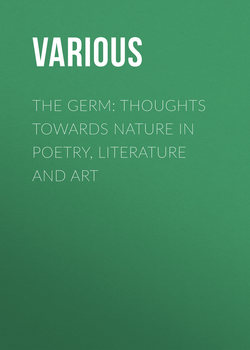Читать книгу The Germ: Thoughts towards Nature in Poetry, Literature and Art - Various - Страница 12
The Germ: Thoughts towards Nature In Poetry, Literature, and Art.
No. 1. January, 1850
Hand and Soul
Оглавление“Rivolsimi in quel lato
Là 'nde venia la voce,
E parvemi una luce
Che lucea quanto stella:
La mia mente era quella.”
Bonaggiunta Urbiciani, (1250.)
Before any knowledge of painting was brought to Florence, there were already painters in Lucca, and Pisa, and Arezzo, who feared God and loved the art. The keen, grave workmen from Greece, whose trade it was to sell their own works in Italy and teach Italians to imitate them, had already found rivals of the soil with skill that could forestall their lessons and cheapen their crucifixes and addolorate, more years than is supposed before the art came at all into Florence. The pre-eminence to which Cimabue was raised at once by his contemporaries, and which he still retains to a wide extent even in the modern mind, is to be accounted for, partly by the circumstances under which he arose, and partly by that extraordinary purpose of fortune born with the lives of some few, and through which it is not a little thing for any who went before, if they are even remembered as the shadows of the coming of such an one, and the voices which prepared his way in the wilderness. It is thus, almost exclusively, that the painters of whom I speak are now known. They have left little, and but little heed is taken of that which men hold to have been surpassed; it is gone like time gone—a track of dust and dead leaves that merely led to the fountain.
Nevertheless, of very late years, and in very rare instances, some signs of a better understanding have become manifest. A case in point is that of the tryptic and two cruciform pictures at Dresden, by Chiaro di Messer Bello dell' Erma, to which the eloquent pamphlet of Dr. Aemmster has at length succeeded in attracting the students. There is another, still more solemn and beautiful work, now proved to be by the same hand, in the gallery at Florence. It is the one to which my narrative will relate.
This Chiaro dell' Erma was a young man of very honorable family in Arezzo; where, conceiving art almost, as it were, for himself, and loving it deeply, he endeavored from early boyhood towards the imitation of any objects offered in nature. The extreme longing after a visible embodiment of his thoughts strengthened as his years increased, more even than his sinews or the blood of his life; until he would feel faint in sunsets and at the sight of stately persons. When he had lived nineteen years, he heard of the famous Giunta Pisano; and, feeling much of admiration, with, perhaps, a little of that envy which youth always feels until it has learned to measure success by time and opportunity, he determined that he would seek out Giunta, and, if possible, become his pupil.
Having arrived in Pisa, he clothed himself in humble apparel, being unwilling that any other thing than the desire he had for knowledge should be his plea with the great painter; and then, leaving his baggage at a house of entertainment, he took his way along the street, asking whom he met for the lodging of Giunta. It soon chanced that one of that city, conceiving him to be a stranger and poor, took him into his house, and refreshed him; afterwards directing him on his way.
When he was brought to speech of Giunta, he said merely that he was a student, and that nothing in the world was so much at his heart as to become that which he had heard told of him with whom he was speaking. He was received with courtesy and consideration, and shewn into the study of the famous artist. But the forms he saw there were lifeless and incomplete; and a sudden exultation possessed him as he said within himself, “I am the master of this man.” The blood came at first into his face, but the next moment he was quite pale and fell to trembling. He was able, however, to conceal his emotion; speaking very little to Giunta, but, when he took his leave, thanking him respectfully.
After this, Chiaro's first resolve was, that he would work out thoroughly some one of his thoughts, and let the world know him. But the lesson which he had now learned, of how small a greatness might win fame, and how little there was to strive against, served to make him torpid, and rendered his exertions less continual. Also Pisa was a larger and more luxurious city than Arezzo; and, when in his walks, he saw the great gardens laid out for pleasure, and the beautiful women who passed to and fro, and heard the music that was in the groves of the city at evening, he was taken with wonder that he had never claimed his share of the inheritance of those years in which his youth was cast. And women loved Chiaro; for, in despite of the burthen of study, he was well-favoured and very manly in his walking; and, seeing his face in front, there was a glory upon it, as upon the face of one who feels a light round his hair.
So he put thought from him, and partook of his life. But, one night, being in a certain company of ladies, a gentleman that was there with him began to speak of the paintings of a youth named Bonaventura, which he had seen in Lucca; adding that Giunta Pisano might now look for a rival. When Chiaro heard this, the lamps shook before him, and the music beat in his ears and made him giddy. He rose up, alleging a sudden sickness, and went out of that house with his teeth set.
